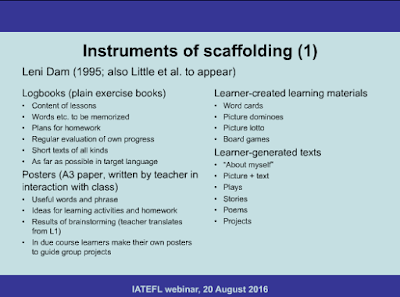Some weeks ago I was able to see the interesting webinar which was presented by David Little. The webinar was online on 20th August and it was offered thanks to a group of professionals - IATEFL http://www.iatefl.org/.
This organization runs regular CPD webinars , just check online- they are offered for free and are seen by many teachers of English living in different countries :
http://www.iatefl.org/web-events/webinars
http://www.iatefl.org/web-events/sig-webinars
Who is the Presenter
David Little has been a Professor at Trinity College Dublin and has studied the issue of learner autonomy and language learning- online I have found a lot of materials he has been working on- - European Language Portfolios and Learners
The European Language Portfolio ( ELP) is part of his great work in the European Union and teachers have been involved in implementing it:
ELP Material 2008 pdf document
The Webinar : Learner autonomy and its implications for the discourse of language teaching and learning
The webinar described how some learners can be successful and what teachers should do in order to help all the students master their knowledge and their autonomy.
He focussed on different learning environments and how students could better while they were or became more aware of their learning process. This link is important as in our learning situations, the traditional ones with students who are learning in a non-English-speaking country we often face the issue of students who are passive learners and do not work well and they lack autonomy.
Reflecting on our traditional way of learning and by analyzing learning situations in which learning happened and had a lot of successful learners can help us think about what language activities teachers should do:
The teacher can support the learner but what is really important is the idea of creating a good learning environment which can facilitate and support students: the role of L1 is not neglected and L1 is still important
An interesting idea presented by Professor Little was the one about optimal learning environments: intrinsic motivation is the key for promoting autonomy and the students' success
He underlined the fact that the target language is used not only for working in class but also by the students when they are thinking and reflecting about their own learning.
This is really important as good learners can reflect on their process of learning . In my experience as a teacher of English I have done a lot of activities and created a lot of tasks to help my learners but I have never asked my students to use the language as a reflective activity. This will be my great goal this year as I am aware that in some ways I have made some mistakes while I tried to be supportive but did not give my learners " the tools" or rather " the tasks" which might help them and drive their learning and their autonomy.
The role of Writing- a key idea in the presentation
I have always used writing as a controlled activity but what was suggested in the webinar was a great way for building autonomy among learners. We should provide opportunities for our learners who write down about what is happening in their learning . Working on reflection and narration can enhance their autonomy as learners.
The webinar ended with a long list of activities which we can use and can provide opportunities for learners who are working on the language and their autonomy: instruments of scaffolding
What new ideas about learning and learners did the Presenter introduce?
- any learner can learn well if he or she is aware of the progress and what has been done or achieved when studying the foreign language
- L1 can be used and it is also important for the learners- teachers can, therefore ,use it if they are not English mother-tongue speakers
- teachers need to provide opportunities for using the language not only in a guided written discourse but also in the personal reflections on what has been done
- teachers need to think about writing tasks which help the learners : blogs, reflective
writing , portfolios are just some good examples . I would also add writing articles for the school magazine or online presentations or working on digital storytelling thanks to the modern web tools.
Professor Little provided some examples of students' assessing their progress: they showed the great level of language reflection they had and they used English in a correct way!
Useful ideas and tips
Ideas for scaffolding can be found online :
https://eal.britishcouncil.org/teachers/great-ideas-scaffolding-learning










